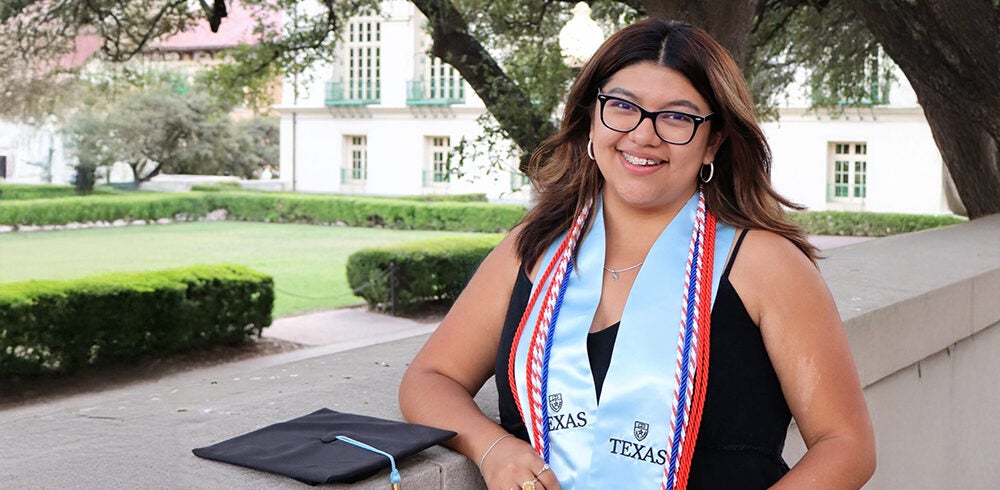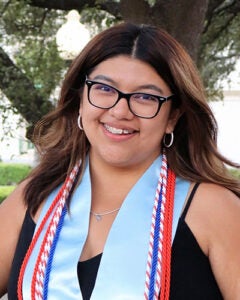
Nickoll Santos Garcia B.S. ’25, Youth and Community Studies. Gilman, Impact and Rapoport Scholar and recipient of Michael Mizell Mankins Endowed Presidential Scholarship in Education.
What has changed the most about you since your first year at UT Austin?
Looking back at being a freshman, everything seemed so big and scary – especially being a first-generation college student and high school graduate. I felt like everything was in jeopardy of being taken away, and I could fail at my classes or get one email saying I owed a lot of money. I just walked through campus very carefully to not let that happen.
Now, there are memories across the Forty Acres, and it doesn’t seem as big. There is a sense that this is my campus – and I want to help others feel like it is theirs, even though that was not my experience during my first few of months as a freshman.
I walk through campus today and I don’t have this fear or pressure. I just have this excitement to be able to graduate.
What is something you believed or expected as a freshman that you think differently of now?
I thought that this whole process was going to be a lot scarier than it was, and I expected to feel very lonely. But there was a turning point in my college career where I decided, “You know what? I am going to ask for help, and anyone who says they want to get coffee with me, I am taking them up on their offer.”
I started to reach out and schedule coffee with people I knew but had never had a one-on-one conversation with. I realized that people want to get to know you, and they’re often cooler than you might think. But unless you take the initiative to meet them, you will never get to know them, and they will never get to know you.
As a senior, I am very comfortable with cold emailing and networking – things I once considered very scary. I have realized how important human connection is, though our busy lives often make it something we don’t prioritize. Now, it’s second nature for me to meet people and send a LinkedIn connection.
How do you think this growth will help in your career and post-graduate life?
My major is a very interdisciplinary and broad education degree, and I will be graduating without a teaching certification. Being able to connect with people will be a huge asset as I figure out the different routes I can take in education.
Throughout my college career, what I have wanted to do professionally has shifted with every job and internship experience that I’ve had – whether it is higher education or working with high school students on college access or youth development. Being able to connect with people will be vital as I explore what I want to do and as my path continues to evolve throughout my life.
Was there one class, project or moment that was a defining moment of your time at UT?

I would say it was the course Individual Differences with Professor Katie Tackett, who is amazing. That class changed how I think about education and what I want to do professionally. It is one of the broad, interdisciplinary education classes, open to all majors, and focuses on educating and working with students with disabilities.
That course made me realize that this is what I want to do professionally, not just work with low-income, first-generation students like me but also branch out into identities I don’t hold yet. More people than you might think have a connection to disability, whether it’s themselves, someone in their household or someone in their community.
I was really focused my first two years of college on sticking to what I know and getting good at it. But then, getting thrown into the world of disability studies was a moment that showed me I need to be challenged. This experience has helped me challenge myself to think deeply about things I had never thought of before.
How did COE live up to or exceed the expectations you had?
The College of Education at UT Austin really supported me through my youth and community studies degree. I had this misconception that COE was only for people pursuing majors with teaching certifications. That was one of the reasons I struggled a little to find a major to transfer into. Because it is so broad, I thought I would be lost and wouldn’t know how to apply the major to what I wanted to do professionally.
But I didn’t realize the field of education is also very broad, and the faculty and professors were really open to the idea that what you want to do now might not be what you want to do later. They focused on giving us the best skills to be a well-rounded person in the workforce.
I was learning cognition and linguistics analysis, tutoring students through Texas Global and learning about language policy as well. There was so much, and I felt supported in pursuing whatever it was that I wanted to pursue. The College of Education really surpassed my expectations in that I never felt lost, despite having a very broad major and interdisciplinary minors.
How did your COE experience prepare you for graduate school in education?
The tagline here is What Starts Here, Changes the World, and the statement for the Harvard Graduate School of Education is Learning to Change the World. Being at the College of Education prepared me to have this personal approach to education and to see how my experiences and identities influence it.
That’s the type of leadership style I bring to education and a big part of why I have been successful. I am always trying to connect with people and be a person first, before I am a teacher or a mentor. Those values really align with the Harvard Graduate School of Education’s mission.
The College of Education’s commitment to social justice has motivated every internship, volunteer experience and career path I’ve taken because I am always looking to impact people. When I first looked at the core priorities of the Dean, I remember being blown away. It wasn’t just about how can we teach students to get an A on their assignment, but about how can we bring in their families and their communities, how can we support them through transitions – not just from elementary to middle school, but through life transitions and whatever else comes their way.
Education is so much more than curriculum and instruction. Learning that and engaging with that idea through my studies and experiences, prepared me to create a strong, well-rounded application for Harvard’s master’s program. It helped me clearly state: I know what I want to do, and this is why I want to keep pursuing this for the rest of my life.

